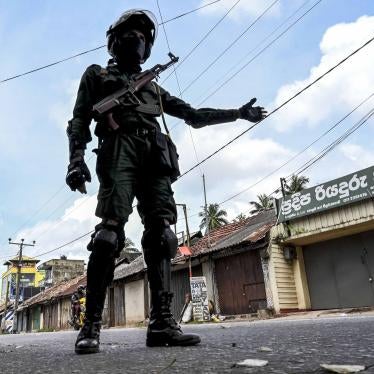(New York) - Condemning the attacks that killed at least 175 people in Mumbai, Human Rights Watch today called upon the governments of India and Pakistan to cooperate in a prompt and thorough investigation to identify the perpetrators and planners of the attacks and hold them accountable.
Beginning on November 25, 2008, at least 10 unidentified gunmen attacked two large hotels, a hospital, a Jewish center, a railway station, and other sites in Mumbai. The siege ended on November 28.
"No political cause can ever justify such horrific and wanton violence," said Brad Adams, Asia director at Human Rights Watch. "After Mumbai, the Marriott bombing in Islamabad, bombings in Delhi in September, and the many other attacks against civilians in India and Pakistan, now is the time for the leaders of both countries to work together to address this scourge."
While it is unclear who organized the attacks, preliminary evidence suggests that Pakistan-based groups may have been involved. Indian Prime Minister Manmohan Singh has said that "elements" in Pakistan may have been responsible for the attacks, and his government has called on Islamabad to honor its commitment to prevent the use of its territory for acts of terror against India. Many commentators also suggest that attacks on this scale required assistance from within India.
Pakistan has denied any role in the attacks, but has said that it will investigate any evidence provided by India to determine if any group in Pakistan was responsible. The commitment to cooperate should also include the army and intelligence services.
"Indians and Pakistanis have repeatedly been victims of terror attacks," said Adams. "The two governments need to respond with cool heads to such atrocities, beginning with cooperation in the investigation and the prosecution of the perpetrators. Terrorism is a problem that needs to be addressed both within borders and regionally."
The attacks in Mumbai are the latest in a string of bombings and other violent attacks in India in 2008, in which hundreds of people have been killed. In October, bombings in Assam state, in northern India, claimed nearly 80 lives. That same month, 17 died in Manipur from bomb blasts. In September, a series of bombs in crowded markets in New Delhi left more 26 dead. In July, 57 died in bombings in Ahmedabad. In May, 68 people were killed in serial bombings in Jaipur.
In August 2007, 43 people were killed in two bombings in Hyderabad, at a popular restaurant and a public park. In February 2007, 66 people were killed by two firebombs on the "Samjhauta Express," the India-Pakistan friendship train. At Malegaon, Maharashtra, 40 people were killed in two blasts in September 2006. In July 2006, 209 people were killed by seven bombs on suburban trains and stations in Mumbai.
In 2001, India blamed Pakistan for an attack on the Indian Parliament building, which could have killed the country's top leadership. The two countries deployed troops to the border, and war was prevented only after international intervention.
Human Rights Watch called for the Indian government to take action to deter such attacks in the future. This would include measures to: better coordinate intelligence gathering, sharing and dissemination; end turf battles between the central government and state governments; provide better training and equipment to law enforcement officials; and work with and, where necessary, accept training and assistance from external law enforcement agencies with a more sophisticated approach to counterterrorism work.
After previous terror incidents there have been widespread allegations that Indian security forces have committed arbitrary arrests and torture. Muslims have often been targeted. Human Rights Watch called on the Indian government to use only lawful means to investigate the attacks and bring perpetrators to account.
"Given the criticism of the Indian counter-terror and intelligence agencies, police investigators are under a lot of pressure to find the masterminds and any accomplices to the Mumbai attacks," said Adams. "But they should not take the short-cut of torture or rounding up the usual suspects. This has failed in the past to solve crimes or prevent new attacks, and has only succeeded in alienating minority communities. It is critical that any detentions and prosecutions conform to India's constitution and international law."
Human Rights Watch also called on the Pakistan army and intelligence services to cooperate with the Indian investigation, wherever the evidence leads. There are concerns in India and elsewhere about the commitment of the Pakistani state to shut down militant groups who carry out terror attacks.
"Pakistan's foreign minister was right to say, ‘We are facing a common enemy,'" said Adams. "But on matters of national security policy, the army and intelligence services still call the shots in Pakistan and it's not clear if they will allow the government to shut down groups in Pakistan who may have been involved in the Mumbai attacks and other outrages."






